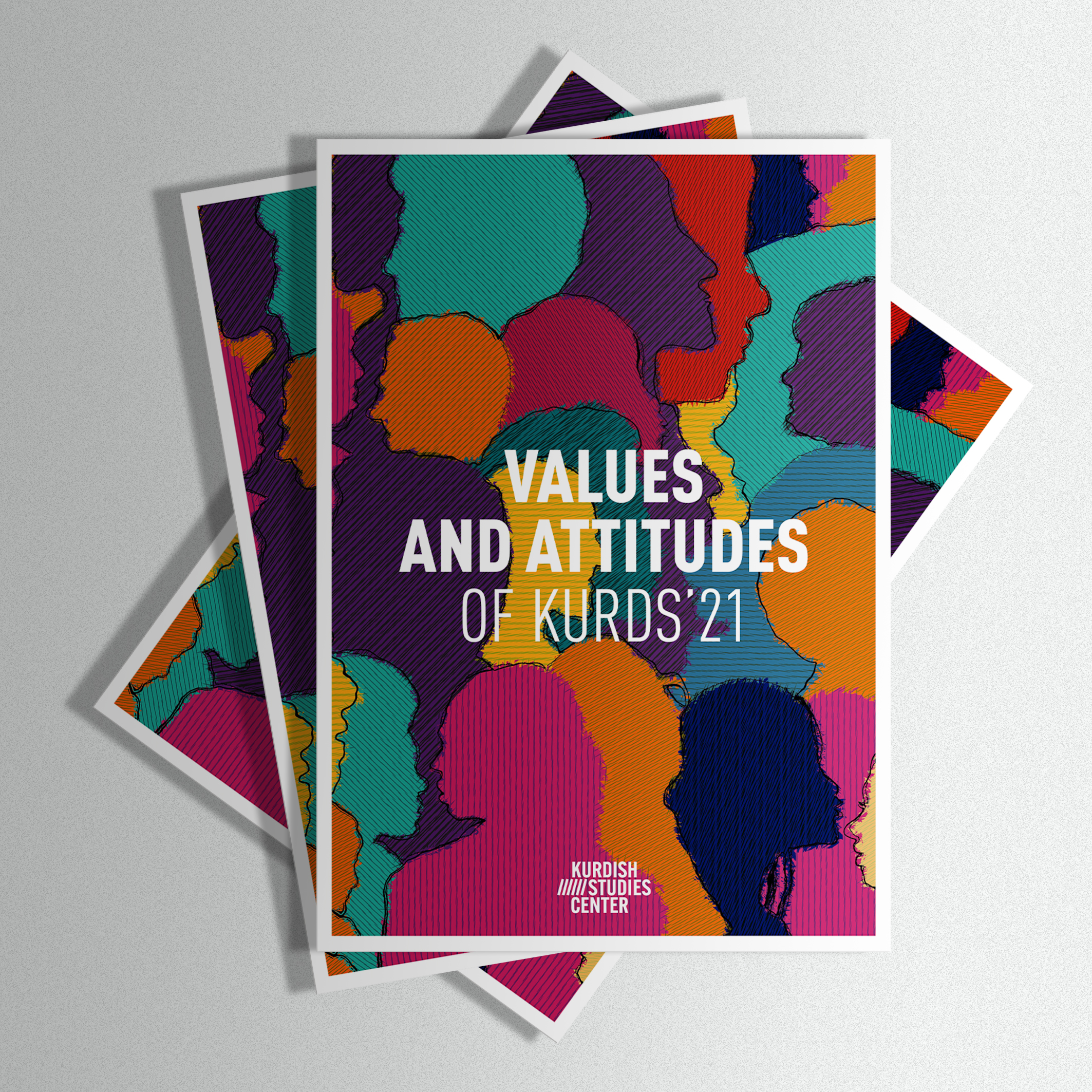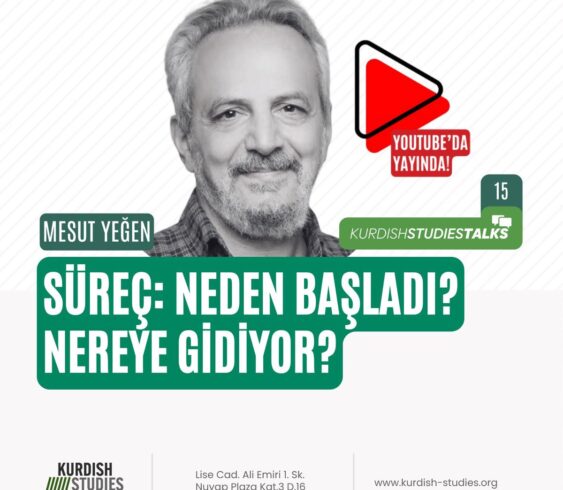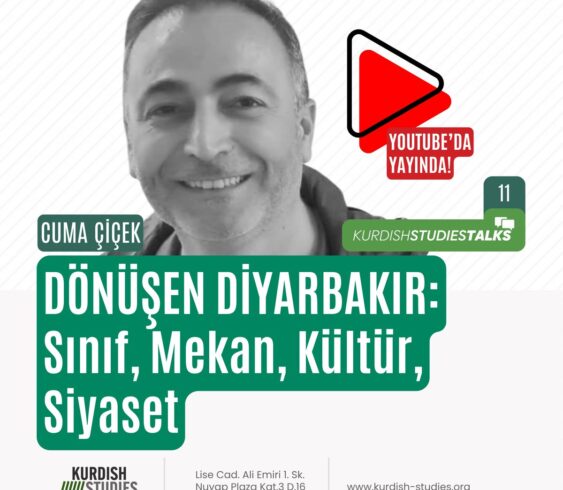Values and Attitudes among Kurds’21 Research

The report of the Values and Attitudes among Kurds Research, conducted by the Kurdish Studies Center, has been published.
This study, carried out in cooperation with the Heinrich Böll Foundation Türkiye Office and with field support from Rawest Research, aims to gain a deeper understanding of the value judgments and attitudes of Kurds aged 18 and over across 11 cities in Türkiye. It also seeks to identify and highlight their similarities and differences with each other and with the broader Türkiye society.
The report’s main finding is that, in addition to similarities and differences between Kurds and the general population of Türkiye, Kurds themselves show variation based on factors such as worldview, political orientation, migration experience, and, to some extent, gender.
You can read an extended summary of the report below and download the full version via the link at the bottom of the page.
…
Kurds: Muslim, Libertarian, and Democratic
Among participants, identities such as Muslim, libertarian, religious, and democratic stand out. AK Party supporters tend to identify more with Muslim, religious, and conservative identities, while HDP supporters prominently display libertarian, Muslim, and Kurdish rights advocate identities. Kurdish nationalism appears to be present among approximately 10% of Kurds. Among Kurds who support CHP, secular and liberal emphases stand out, distinguishing them from other groups.
Low Life Satisfaction
Kurds stand out distinctly from the rest of Türkiye when it comes to life satisfaction. More than half of the participants reported low life satisfaction. Those living in the region, small towns, men, and young people form the groups with lower life satisfaction. Participants’ household incomes are low, and their households are larger than the average in Türkiye. The majority of participants fall into the low-income group.
Religiosity Remains Strong
More than two-thirds of participants associate religiosity with positive meanings. About 10% describe religiosity with negative connotations. Positive concepts include “goodness,” “morality,” and “spirituality,” while negative ones include “unnecessary,” “bigotry,” and “oppression.” Contrary to common assumptions, religiosity is not low among HDP voters. Political views do not show significant divergence regarding religious practices. More than four-fifths of HDP supporters pray regularly or occasionally. The rate of regular prayer among HDP and AK Parti voters is similar (50% vs. 44%). Although the rates are close, HDP and CHP supporters are more represented among those who never pray or have gradually stopped/prayed less over time.
Those who identify as having no religious belief mostly come from the left side of the political spectrum and HDP supporters. In this group, the ratio of men is more than twice that of women.
News Watched on TV but Trust in Media is Low
Two-thirds of participants watch TV news. The most preferred TV channel is Fox. Fox TV has also become the most-watched channel among AK Parti voters. Among viewers, 49% of CHP supporters, 34% of HDP supporters, and 17.7% of AK Parti supporters watch news on this channel. Fox TV is followed by A Haber, ATV, and TRT channels. Most viewers of these channels are supporters of right-wing/conservative parties. Besides these mainstream channels, other channels are also watched. Notably, 12.6% of HDP supporters watch Stêrk TV, which is different from other participants.
The most trusted channel is also Fox TV, followed by Halk TV and TRT channels. A Haber, Sözcü, and Anadolu Agency (AA) are the least trusted news sources among participants. Among the least trusted outlets, Yeni Akit and A Haber lead. Distrust towards Akit exceeds 40% even among those who identify as right-wing and AK Parti supporters.
Attitudes Vary According to Gender, Political Views, and Migration Experience
In terms of values and attitudes, Kurds show a high degree of political and social similarity with the rest of Türkiye. However, worldview, political inclination, migration, and, to some extent, gender emerge as the main factors that differentiate Kurds from one another. The economy is a common concern that unites almost all participants. Looking at the internal divisions among Kurds, those living in the region and those in the West share common concerns on education and the justice system, while those living in the region also emphasize women’s issues and the Kurdish question.
Participants perceive Kurds as more hardworking, hospitable, helpful, honest, and environmentally conscious than Turks, and they view themselves as ahead of both groups in these universal and moral values. There is also a widely shared lament about societal “degeneration,” particularly regarding changes in youth behavior. The view that young people’s morality is deteriorating finds 87% support in small towns. Although this rate decreases among Kurds living in the West, overall it is accepted by 65% of participants.
Regarding perceptions of gender, participants show a relatively liberal attitude toward women, but traditional norms still strongly influence society. Compared to the broader Turkish society, Kurds hold more liberal views on gender issues. Groups with this tendency are mostly those who identify as left-wing and HDP supporters. Conversely, those identifying as right-wing and AK Parti supporters tend to believe, based on traditional and religious legitimizations, that men and women are not equal and that authority should rest with men.
Moreover, migration is an important factor shaping Kurdish experiences, and a more “Turkified” Kurdish identity is emerging, shaped by “migration generations.” The agendas, demands, and identity formations of Kurds living in Western Türkiye and planning their futures there are gradually changing. This development differentiates Kurds in the West from those living in the Region.
Generations Differ from Each Other
The education gap between Kurds and their parents stands out compared to the rest of Türkiye. The gap between participants’ education levels and those of their parents is very wide. However, children of parents with higher education levels also stand out positively compared to others. Regarding the age of marriage, singles differ significantly from both married participants and their parents. Singles consider the appropriate age for marriage to be 8 years older than married participants and 10 years older than their parents.
Most participants identify themselves as Muslim/Sunni/Shafi’i. Although their parents are religious, some participants state that they are not as religious as their parents and do not practice religious rituals. In this respect, compared to the previous generation, religiosity has changed and tends to decrease, while a more critical attitude within religiosity is developing among young people.
They are not politically homogeneous; positioning more towards the center and right
The study’s findings challenge the common assumption that the majority of Kurds position themselves on the left of the political spectrum. Most Kurds place themselves in the Center (47.2%) rather than the Left. While a majority outside the Center position themselves on the Left (31.2%), a significant portion (21.4%) identify as being on the Right. As expected, positioning on the right or left is a key factor influencing differences in attitudes; however, it is notable that among Kurds there are shared commonalities in their approach to values despite these diverse political views.
For religious participants, religious beliefs serve as a decisive factor in their political preferences. One manifestation of this is the strong perception among right-wing religious conservatives that the left is “distant from religion.” This image of the left influences religious conservatives to distance themselves from the left and lean toward the right.
Political-national fears of division and external threats, which are prominent attitudes within the Turkish right, also find resonance among right-wing/conservative Kurdish participants. A significant portion of participants (28%) believe that “Jews control the world,” “Zionists have their eyes on these lands,” and that there are external threats directed at Türkiye. These fears are notably weaker among participants who lean toward the left.
Nationalist Tendencies Differ from the General Trend in Türkiye
For most participants, nationalism as a phenomenon carries negative connotations. Those who view nationalism negatively tend to relate this attitude to “ummah-ism” or the leftist “internationalist” worldview, or to understanding and experiencing Turkish nationalism as an exclusionary form of nationalism. In this sense, interpreting nationalism as a dominant and exclusionary form can reveal a distancing attitude toward this phenomenon.
However, when moving to a more concrete context such as Kurdish nationalism, this negative attitude softens. Participants tend to view Kurdish nationalism as more acceptable because they perceive it as a demand for rights that does not exclude other identities. In this context, about one quarter of participants see themselves as strong Kurdish nationalists. Two-thirds of HDP voters embrace Kurdish nationalism at a medium or high level, while nearly half of AK Parti voters also identify with this identity.
Opposition to immigrants and distance to different identities are noticeable but lower than the national average in Türkiye
Participants’ views on refugees are generally negative. However, the exclusionary rhetoric visible in Türkiye regarding Afghan and Syrian refugees is not as strong in the Kurdish region. For example, opposition to Afghan migrants and demands for the return of Syrian refugees are over 50% higher in the general population of Türkiye than in the Kurdish public opinion.
The identities to which participants show the least tolerance are homosexuals and atheists. Although tolerance toward these identities is higher compared to the general population of Türkiye, this does not change the fact that participants predominantly hold negative attitudes toward these groups.
Strong Perception of Inequality
The majority of participants believe that Kurds and Turks are not treated equally by the state. Among AK Parti supporters, the dominant view is that inequality has decreased over time, whereas HDP voters have a strong perception of inequality both economically and in terms of identity. Less than a quarter of AK Parti voters think equality does not exist, while this rate rises to about half among CHP supporters and exceeds three-quarters among HDP voters. Similarly, this belief is shared by about one-third of right-leaning participants and about three-quarters of left-leaning participants.
Participants perceive the peace process as a period during which inequalities decreased and both Kurds and the society of Türkiye were able to “breathe easier.” For this reason, support for the peace process, like the issue of mother tongue rights, becomes a widely shared attitude cutting across all participant groups.
The Mother tongue is a Common Demand
The issue most frequently emphasized by participants regarding the Kurdish question, and the area where demands are most concentrated, is the mother tongue. The mother tongue emerges as a common demand shared by Kurds across different viewpoints. It is also the most significant issue related to the perception of inequality. Some participants believe Kurdish should be taught as the language of instruction, while others think it should be offered as an elective course. Even if Kurdish is recognized as a language of education and instruction, it is emphasized that the issue cannot be resolved without addressing the related employment problems. Participants also largely agree on demands for public services and education in the mother tongue. Those who identify as right-wing, centrist, or left-wing, as well as supporters of AK Parti, HDP, and CHP, all express support for these demands.
AK Parti is losing support, while CHP is gaining ground.
The parties most supported by the participants are HDP and AK Parti, with CHP ranking third. When looking at changes in voting preferences compared to 2018, it is seen that AK Parti and MHP have lost votes, while parties such as CHP, Deva, and Gelecek have gained votes. HDP’s vote share has also slightly decreased.
Half of the participants, if their preferred party does not enter the election, tend to boycott or remain undecided rather than choosing a second party. Among second party preferences, CHP and MHP stand out. HDP supporters tend to choose CHP, while AK Parti supporters lean towards MHP. Deva Party is the third choice for AK Parti voters. It is observed that AK Parti has lost 16% of its votes, and at least 11% of this loss has gone to the opposition front. However, the votes gained by CHP and HDP do not compensate for approximately 5 percentage points lost by AK Parti. Among voters who did not vote in 2018 and those voting for the first time, AK Parti falls behind CHP. Four out of every ten non-voters tend to protest vote. This rate is about one in four among first-time voters. Therefore, although opposition support is stronger among non-voters, their motivation to go to the polls remains relatively low.
The politician whom participants feel closest to is Selahattin Demirtaş, followed by Deniz Gezmiş. Erdoğan ranks third among living politicians and seventh overall. The politicians participants feel furthest from are Süleyman Soylu and Devlet Bahçeli. However, these figures are still seen as close by more than one-third of AK Parti supporters.
Download PDF Report
